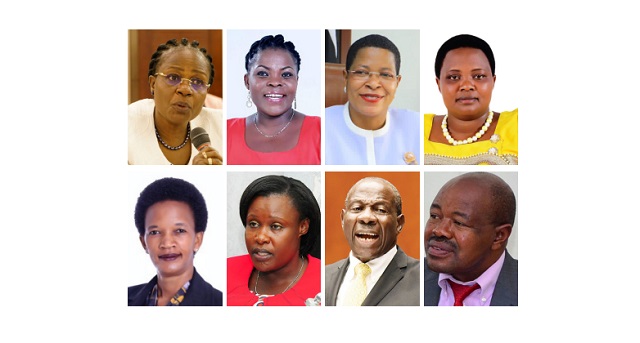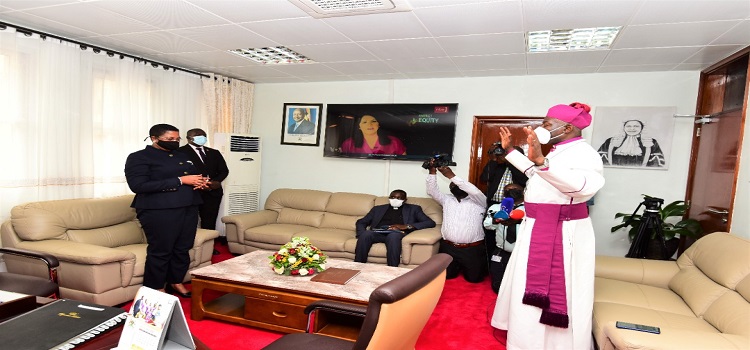
Speaker Anita Among is accused of corruption
When Neoliberalism turns Ugandan mothers of the nation into thugs without a conscience: Female Ministers dominate the list of thugs of Karamoja Iron Sheets
https://watchmanafrica.blogspot.com/2023/03/when-neoliberalism-turns-ugandan.html

Women leaders under fire as corruption scandals shake Uganda
Written by Ashley Aisha Aine

There was a
time when women were proud of their representation in parliament and
government offices, but lately, the character of women in power is
coming under scrutiny.
The news that the three Ugandan
officials sanctioned by the UK for corruption are all women has been
particularly shocking and unprecedented.



Anita Among's Bukedea mansion
Speaker of Parliament Anita Annet Among,
former minister for Karamoja Affairs Dr Maria Goretti Kitutu, and
former minister of State for Karamoja Affairs Agnes Nandutu have
received far-reaching sanctions from the UK government for their roles
in corruption and the theft of iron sheets intended for some of Uganda’s
poorest in Karamoja.
This development raises important
questions: what do other Ugandan women think about the current female
leaders in power? Is this still a case of women’s emancipation, or have
women simply been emancipated to steal as ‘efficiently’ as their male
counterparts?
The era of pioneering female leaders
such as Miria Matembe, Cecilia Ogwal, Speciosa Wandira Kazibwe, Winnie
Byanyima, Winnie Kiiza, Salaamu Musumba, Victoria Ssekitoleko, Joyce
Mpanga, Rhoda Kalema, and a few others has come to an end. These
trailblazers set a high standard for integrity and dedication in public
service.

Anita Among's Bukedea mansion
In their place, a new generation of
female politicians has emerged, leaving many of the women they represent
cringing in embarrassment. The recent sanctions imposed by the UK on
Speaker of Parliament Anita Annet Among, former minister for Karamoja
Affairs Dr Maria Goretti Kitutu, and former minister of State for
Karamoja Affairs Agnes Nandutu for their involvement in corruption have
only intensified this sentiment.

Here is what some Ugandan women have to say about the current state of female political leadership:
Najjumba Jovia Ssali, 23, law student
“Do I think the new crop of female
politicians have kept and fueled the agenda that led to the women’s
representation movement? My answer is yes, they have sustained the
far-fetched dream; however, it has now become a political card used by
most, hence forgetting the core values.

I believe there is more that can be done
by the women members of parliament in Uganda. There is need to address
and work on certain gender barriers that are never addressed. I am not
disappointed with the regime because we are surely not moving
backwards.”
(Name withheld on request), 28, lawyer
“[Rebecca] Kadaga’s regime and the women
politicians during Idi Amin’s regime were good. Kadaga was motherly,
and her regime often reflected on the question: ‘What will Uganda look
like without me?’ She made foresighted decisions. But the people we have
now...!”

Nambaziira Vivian, 29, trader
“Jennifer Musisi (former KCCA executive
director) and Rebecca Kadaga (former speaker of parliament) ...those
ladies really gave attention to the muntu wa wansi (people at the
grassroots). They were not greedy; they were truthful and patriotic.
The impact of corrupt women officials on
the women of Uganda, particularly young women, is profound and
multifaceted. From perpetuating inequality and injustice to impeding
access to essential services and eroding trust in institutions, the
consequences are far-reaching and detrimental to the development and
empowerment of women.”
Victoria Ssekitoleko, 75, activist, former cabinet minister, former diplomat
“In a democracy, the people get the
leadership they elect and deserve, irrespective of gender. Is it still
emancipation? Yes! Maybe slow, but ongoing. Women’s emancipation is
moving at the same pace and style as the rest of Uganda!”
Jackline Atim, 37, teacher
“Please, can we stop pretending that those demanding accountability are homosexuals? It is now embarrassing.”
Dr Patricia Litho, board chair UMWA; assistant commissioner for communication, ministry of Energy
“Comparing different generations of
women politicians is complex because each era faces unique challenges
and opportunities. The earlier generation often had to break through
significant barriers to even enter politics, paving the way for future
generations.
As a women’s rights advocate, I believe
in holding all individuals accountable for their actions, regardless of
gender. While it’s concerning that all the sanctioned individuals in
this case happen to be women, it is essential to focus on addressing
corruption and promoting transparency, irrespective of the gender of
those involved.
Women can and should be held to the same
standards of integrity and accountability as men. It is crucial to
avoid reinforcing harmful stereotypes or narratives that could undermine
efforts to achieve gender equality. Most importantly, women who have
been suddenly thrust into leadership positions must be prepared and
given proper orientation on leadership and accountability.”
Nantongo Peninah, 82, vendor (translated)
“I think the Speaker [Anita Annet Among]
should stand firm on the [anti-homosexuality] law that she helped pass,
and not dance to the White man’s fiddle. For the sake of our country
and our culture, she should stand firm.”
Nakisozi Betty, 45, headteacher
“I have some personalities I feel have
tried to represent us as women – Miria Matembe, Rebecca Kadaga, and Jane
Ruth Acheng are some of them. They say, ‘What a man can do, a woman can
do better.’ However, these women politicians have been influenced by
male politicians who have become wolves and vultures. They observe how
those men become billionaires in the blink of an eye! This makes women
feel that if others can [steal], we [too] can, and this mentality spoils
the integrity of motherhood in them.”
(Name withheld on request), 26, trader
“Most Ugandan politicians enter politics
for government money [and not to serve]; that is why we still have and
will always have corruption problems.”
Anita Rina, 24, journalist
“I am disappointed with the reputation
they have showcased to the public. When it comes to Agnes Nandutu, she
transitioned from being a public figure in the media industry that many
women looked up to, to being accused of stealing iron sheets meant to
help people in Karamoja. This is very unfair, given that many people in
Uganda are suffering, starving, or even homeless.”
(Name withheld on request), 65, newspaper vendor (translated)
“I only care about my job because those
politicians do not help or concern me. There is no woman politician I
can say she did it for me because I suffer alone selling newspapers.”
Dr Emily Maractho,
“Women leaders must be held accountable
like the others. It does not set a good example when women leaders are
named in corruption
and demonstrate poor leadership. However, it is
important to recognize that we are dealing with an all-time low in our
governance indicators, with corruption featuring prominently.
This is a culture that implicates both
men and women. For women, some of it is really uninspiring. The fact
that only women were sanctioned speaks to the level of institutional
malaise we are experiencing. This does not mean only women are corrupt.
There is more to this, including the character of the individuals
involved.”




and demonstrate poor leadership. However, it is important to recognize that we are dealing with an all-time low in our governance indicators, with corruption featuring prominently.